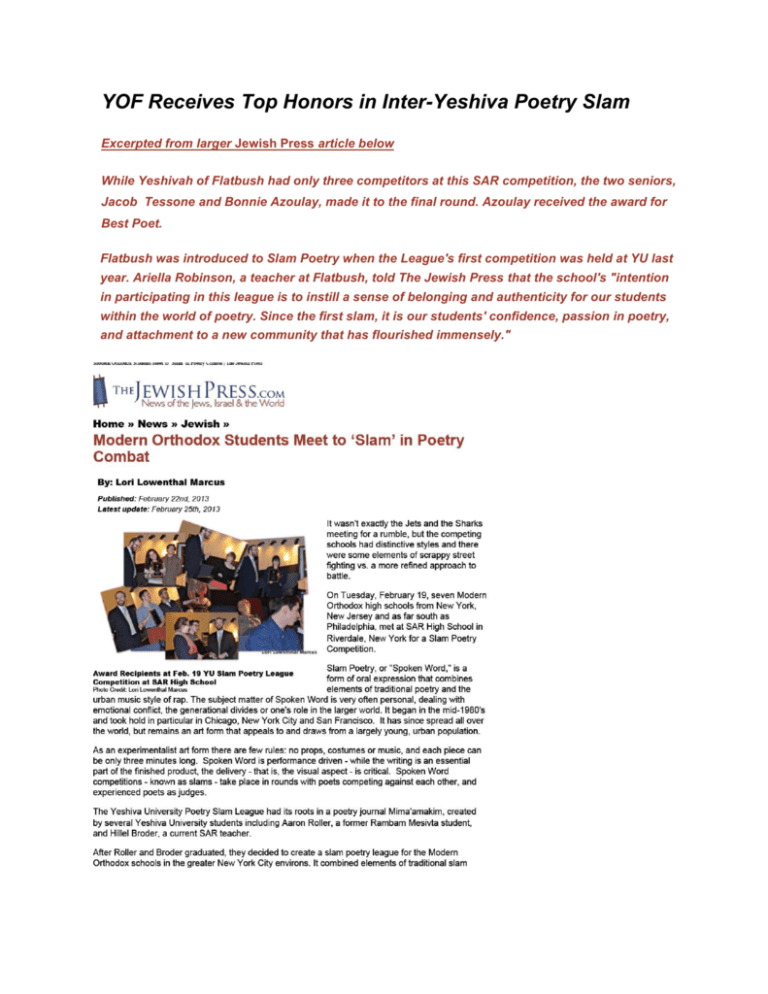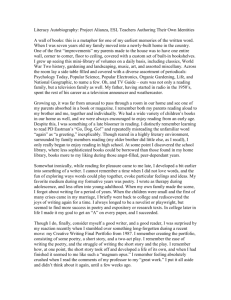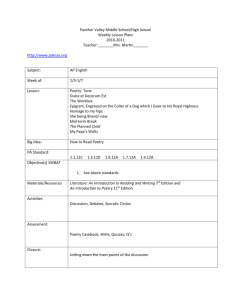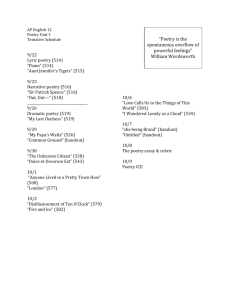
YOF Receives Top Honors in Inter-Yeshiva Poetry Slam
Excerpted from larger Jewish Press article below
While Yeshivah of Flatbush had only three competitors at this SAR competition, the two seniors,
Jacob Tessone and Bonnie Azoulay, made it to the final round. Azoulay received the award for
Best Poet.
Flatbush was introduced to Slam Poetry when the League's first competition was held at YU last
year. Ariella Robinson, a teacher at Flatbush, told The Jewish Press that the school's "intention
in participating in this league is to instill a sense of belonging and authenticity for our students
within the world of poetry. Since the first slam, it is our students' confidence, passion in poetry,
and attachment to a new community that has flourished immensely."
Modern Orthodox Students Meet to ‘Slam’ in Poetry Combat | The Jewish Press
poetry, but with a decidedly Jewish - not comedic shtick Jewish - bent. Roller and Broder joined up
with Hillel Goodman, assistant principal of Rambam Mesivta, who was the first coordinator of the
Yeshiva League.
Broder, who coordinates the SAR team, told The Jewish Press they view the YU Slam Poetry League
as a continuation of the Jewish tradition of religious poetry.
"We look to Rabbi Yehuda HaLevi, the great Spanish poet of the medieval age, and his schools of
poets and poetry," Broder explained to The Jewish Press. "We see David HaMelech, the great
psalmist, as the progenitor of this project, writing with the knowledge that our religion's essential
language of Tehillim is structured in the deep and condensed language of poetic expression."
Broder says he and the SAR administration see this form of artistic expression as "an opportunity for
d'veykut, cleaving to God, developing awareness of the divine."
The League officially began a year and a half ago, with three competitions in the 2010-2011 school
year; this year there will be four. Roller, the driving force behind the mima'amakin movement, is now
the league coordinator and is always one of the judges.
At the February 19 Poetry Slam, 45 students participated in the first round, with fourteen moving on to
the second round.
Roller explained to The Jewish Press between rounds that his vision was to create an opportunity for
students to have an outlet for artistic expression, as well as a format for non-athletes to interact with
students in the other Modern Orthodox schools, similar to what the athletic league provides for
athletes.
Because of his own background - Roller is a published poet - he is interested in encouraging the
Spoken Word students to learn about different forms of poetry. For each competition the students are
required to create both a free verse poem and one that conforms to a particular verse format. Last
year, the students had to write a ghazal, a Persian poetry form that Ibn Ezra and others adopted for
various slichot. In another competition they had to use the haiku format.
At SAR on Feb. 19, the students competed in two formats, a free verse poem and a "pantoum," a
poetic form comprised of four-line stanzas in which the second and fourth lines of each stanza serve
as the first and third lines of the next stanza, and the last line of the poem is often the same as the
first line.
The Yeshiva Slam Poetry League students could have come from anywhere - the girls were dressed
mostly in black, many with fashionably scuffy boots. The boys - other than wearing kippot - also could
have been from any other high school, except that the tzitzit of some were visible, but no one's
underwear was.
The content of many of the poems, however, dealt with various aspects of their relationship to God
and to Judaism. "Six days a week, we wear a mask," recited Rebecca Rosen, a sophomore from
North Shore Hebrew Academy High School in Great Neck, New York. "Help me to understand your
ways," implored Mira Schapiro, a junior at The Frisch School, in Paramus, New Jersey.
Some of the high school poets revealed critical questions about their faith. SAR's Yishai Chamudot
http://www.jewishpress.com/news/modern-orthodox-students-meet-to-slam-in-poetry-combat/2013/02/22/0/?print (2 of 5)3/6/2013 11:11:18 AM
Modern Orthodox Students Meet to ‘Slam’ in Poetry Combat | The Jewish Press
called his pantoum "Son of Man," and described our world as a "pathetic excuse for Eden," infused
with powerful imagery of "split identity, split sea." And the poem of Shira Levy of Central had a hipster
edge. Her poem worked perfectly in the pantoum format, "but you won't because you can't" was a
powerful, biting refrain.
Atara Goodman, a senior from Kohelet Yeshiva High School in suburban Philadelphia, received the
award for Best Pantoum. She described the oddness of writing poetry on an iPad: "...because paper
is how I pray, but the image of paper fades into a pixillated screen..."
"Monotony will certainly be the death of me, breakfast, lunch and dinner, why not dinner first?" asked
Kayla Klein of Yeshiva University High School for Girls (also known as Central), whose sharp
questions and clever wordplay helped her to advance to the final round of the competition.
In addition to SAR and North Shore, the other area schools that have been competing in the league
almost from the beginning, also have a more traditional approach to slamming in that the emotion
tended to be more muted, the themes more overtly religious and representational.
The students from most schools read from paper or from their iphones, as in the case of Moses Bibi,
a freshman from Rambam who also advanced to the finals. Goldman proudly told The Jewish Press
that Bibi is not only a star of the Rambam poetry team, which they call the "Poe Pack," he is also a
member of the school choir and is on the hockey team. In fact, most of the Rambam Spoken Word
stars are very involved with other school teams, including the college bowl and the mock trial and
hockey teams.
The Kohelet Yeshiva High School team were the cowboys - their performance style was much more
urban and theatrical than the other competitors. This is because their entree to this art form came
directly from the world of Spoken Word, as opposed to being originally grounded in the more
traditional styles of poetry or growing out of tehillim.
The Kohelet team's first coach, Cait Hubbard, came from California and had slammed from high
school through college. She talked up the art form at the school, found the students wildly
enthusiastic, and the club took off.
Hubbard could only find one Spoken Word league in the area, and it was only for public schools in
Philadelphia. Problem: Kohelet isn't a public school and it isn't located in Philadelphia. After much
wheedling by Hubbard, the Philadelphia Youth Poetry Movement agreed to allow this Orthodox
Jewish private school from the suburbs to join them.
As Hubbard explained to The Jewish Press, "the Jewish kids looked very different: long skirts and
kippot was not something the Philly kids were used to, and the clothing, attitude and the life
experiences the city kids slammed about made a huge impression on the Kohelet kids." And despite
the difference in backgrounds, when they were slamming, the kids appreciated each others' work
based solely on the merits - religion, class and wealth played no role.
But PYPM met on Friday afternoons, and the restrictions the Kohelet administration had to
impose, declaring certain topics and language inconsistent with Jewish values - were obstacles that
could not be overcome. Rabbi Elchanon Weinbach, the Kohelet Head of School, found out about the
Yeshiva League, and Kohelet joined.
http://www.jewishpress.com/news/modern-orthodox-students-meet-to-slam-in-poetry-combat/2013/02/22/0/?print (3 of 5)3/6/2013 11:11:18 AM
Modern Orthodox Students Meet to ‘Slam’ in Poetry Combat | The Jewish Press
The urban influence was obvious in Kohelet junior and team co-captain Celeste Marcus's
presentations. She received the award for Best Performance.
While Yeshiva of Flatbush had only three competitors at this SAR competition, the two seniors, Jacob
Tessone and Bonnie Azoulay, made it to the final round. Azoulay received the award for Best Poet.
Flatbush was introduced to Slam Poetry when the League's first competition was held at YU last
year. Ariella Robinson, a teacher at Flatbush, told The Jewish Press that the school's "intention in
participating in this league is to instill a sense of belonging and authenticity for our students within the
world of poetry. Since the first slam, it is our students' confidence, passion in poetry, and attachment
to a new community that has flourished immensely."
SAR's Zach Smart received the award for Best Free Verse Poem. A line from his poem was not only
cleverly worded, but was something to which most in the audience could relate: "going where I need
to go in order to get where I want to go, I've quite forgotten where I am."
The Frisch School hosted a slam poetry competition last year, and junior Tamar Palgon was the
runner-up for Best Poet in this one. Her voice sounds like an instrument, and the "wake, wake, wake"
refrain in her poem had a xylophonic quality.
Roller mentioned between rounds that although what drove him to set up the Yeshiva University
Poetry Slam League was to create a social community amongst the modern orthodox high schools,
the greatest source of satisfaction has been his realization that there are lots of really talented poets
in the Modern Orthodox high school community.
Roller's right - these kids rocked.
About the Author: Lori Lowenthal Marcus is the US correspondent for The Jewish Press.
© 2013 The Jewish Press. All rights reserved. Printed from: http://www.jewishpress.com/news/modern-orthodox-students-meet-to-slam-in-poetry-
combat/2013/02/22/
Scan this QR code to visit this page online: Related posts:
http://www.jewishpress.com/news/modern-orthodox-students-meet-to-slam-in-poetry-combat/2013/02/22/0/?print (4 of 5)3/6/2013 11:11:18 AM






